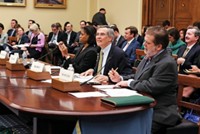Advertisement
Grab your lab coat. Let's get started
Welcome!
Welcome!
Create an account below to get 6 C&EN articles per month, receive newsletters and more - all free.
It seems this is your first time logging in online. Please enter the following information to continue.
As an ACS member you automatically get access to this site. All we need is few more details to create your reading experience.
Not you? Sign in with a different account.
Not you? Sign in with a different account.
ERROR 1
ERROR 1
ERROR 2
ERROR 2
ERROR 2
ERROR 2
ERROR 2
Password and Confirm password must match.
If you have an ACS member number, please enter it here so we can link this account to your membership. (optional)
ERROR 2
ACS values your privacy. By submitting your information, you are gaining access to C&EN and subscribing to our weekly newsletter. We use the information you provide to make your reading experience better, and we will never sell your data to third party members.
Policy
Republicans In Congress Launch Another Salvo Against EPA
Oversight: House of Representatives bill would change membership, operation of agency’s Science Advisory Board
by Cheryl Hogue
April 16, 2013
As part of a larger attack on the Environmental Protection Agency, a congressional committee has approved legislation that would change the makeup and operation of expert panels that advise EPA on scientific matters.
The bill, H.R. 1422, would boost industry participation on panels of EPA’s Science Advisory Board (SAB). It also would significantly weaken SAB panels’ ability to limit oral comments from industry lobbyists or environmental activists—even though at most meetings, the time for board business is tightly allocated. And the legislation would require the board to respond in writing to some of those comments.
Industry organizations, including the American Chemistry Council (ACC), an association of chemical manufactures, are pushing Congress to make these changes. H.R. 1422 has opponents, too, including the Union of Concerned Scientists and environmental groups.
The House of Representatives’ Science, Space & Technology Committee agreed to the bill on April 11 by a vote of 21-16 along party lines. Rep. Christopher D. Stewart (R-Utah), sponsor of H.R. 1422, says the bill will fix “a process that is broken.” Stewart tied the legislation to curbing what Republicans view as EPA’s regulatory overreach.
According to ACC, “The legislation will improve how panels are formed, hold peer review panels accountable in responding to public comment, and ensure that legitimate scientific concerns are transparently addressed.”
In contrast, Rep. Donna F. Edwards (D-Md.) said much of H.R. 1422 “appears to be designed to weaken the scientific independence and integrity of the Science Advisory Board.”
“This is all about tying the board up in knots and making it more vulnerable to corporate influence,” says Celia Wexler of the Union of Concerned Scientists’ Center for Science & Democracy.
H.R. 1422 is among several measures the Republican-controlled House is considering that are aimed directly or indirectly at EPA. Another measure, for instance, would give the Energy Secretary veto power over EPA rules—notably those controlling air pollution—on the basis of costs, without considering benefits. A broader antiregulatory bill would require Congress to approve major regulations—those with an annual impact on the economy of $100 million or more—before they could take effect.
H.R. 1422 faces a good chance of passage in the Republican-controlled House, but its prospects are dim in the Democrat-controlled Senate.



Join the conversation
Contact the reporter
Submit a Letter to the Editor for publication
Engage with us on Twitter